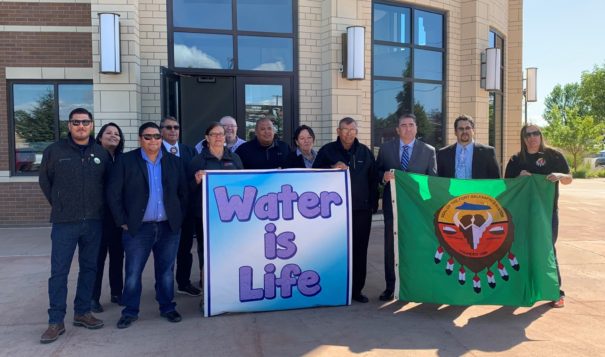News Article Article pages that do not meet specifications for other Trust Project Type of Work labels and also do not fit within the general news category.
Montana senators fail to undermine Biden support for Native stance against KXL Pipeline
 HAZARDOUS PIPELINES
HAZARDOUS PIPELINES
BY RYLEE MITCHELL
BUFFALO’S FIRE CORRESPONDENT
GREAT FALLS, Mont. – Montana Republican U.S. Sen. Steve Daines’ bid to restore the Keystone XL Pipeline construction permit — which President Joe Biden revoked on his first day in office — failed to gain approval in the Senate’s Feb. 5 budget resolution bill, due to an 11th-hour amendment from Senate Majority Leader Charles Schumer of New York.
Vice President Kamala Harris had to break a 50-50 tie, passing the legislation at 5:30 a.m. after a nightlong session of voting. The House of Representatives later approved Schumer’s amended version, clearing the way for Congress to act on a pandemic relief package — but not before Daines slammed the pipeline opposition.
“Early this morning while the American people were asleep, Senate Democrats chose to flip flop on their support for my Keystone XL Pipeline amendment, as well as @SenatorBraun’s amendment to support fracking,” Daines said in an 8 a.m. tweet.
“Early this morning while the American people were asleep, Senate Democrats chose to flip flop on their support for my Keystone XL Pipeline amendment, as well as @SenatorBraun’s amendment to support fracking.”
-U.S. Senator Steve Daines said in a tweet.
He continued: “They chose to stand with Green New Deal radicals over American jobs & blue-collar workers. They chose to stand against tax revenue for counties & low energy costs for families.”
Sen. John Kennedy of Louisiana also criticized Democrats who voted against the project. “The Keystone XL Pipeline supports American jobs, America’s energy independence, and America’s national security. Why President Biden shut it down and 48 Senate Democrats just voted to keep it closed is beyond me.”
Montana’s senior senator, Democrat Jon Tester, voted to pass the amended bill even though earlier he had voted for Daines’ initiative and has advocated building the pipeline throughout its decade-long permit process.
Tester’s spokeswomen Sarah Feldman told major media that his vote for the amended bill did not constitute a change of position, rather responded to his decision that the issue was not key to the budget resolution process.
Since TransCanada Corp.’s proposal for the hazardous tar-sands crude-oil project 10 years ago, on-going lawsuits, direct action resistance, conflicting legislation, and contradictory executive orders have made a rocky road for the pipeline’s private backers.
“The Keystone XL Pipeline supports American jobs, America’s energy independence, and America’s national security. Why President Biden shut it down and 48 Senate Democrats just voted to keep it closed is beyond me.”
– Senator John Kennedy of Lousiana
Among several lawsuits filed here in Great Falls U.S. District Court against carrying out the final segment of construction through Nebraska, South Dakota, and Montana is one by Daines-Tester constituents, the Assiniboine and Gros Ventre tribes of the Ft. Belknap Community.
The Obama Administration vetoed the pipeline in November 2015, acknowledging that it presented effects to the economy, environment, water sources, public health, and safety. When Donald Trump came into office in 2016, he repealed all the restrictions on the pipeline, saying it would create jobs and help the United States economy.
At the start of Biden’s campaign, he promised to cancel the Trump Administration’s permits if elected, and on Jan. 20, he did withdraw the Presidential Permit, noting his climate justice stance mandates it.
Now, the Biden Administration must review other related permits and processes, while facing lawsuits, including those threatened by Alberta Province, which invested heavily in the private Canadian infrastructure abroad in order to deliver its resources to the U.S. Gulf Coast to sell at refineries and ship overseas.
Meanwhile, the proposal has brought First Nations in Northern Alberta to sue the federal government for damages from 15 years of oil sands development for which they were not seeking redress before the pipeline was put in place all the way from Texas to Nebraska.
Tribal nations and grassroots Indigenous water protectors have been holding out due to lack of consultation, claiming the pipeline violates treaty-guaranteed rights of hunting, fishing, and trapping in ancestral territory on both sides of the medicine line between Canada and the United States.
Celebrating the decade-long Native-led fight against the Keystone XL Pipeline, opponents from around the world join in praying for shutdowns of other pipeline projects, such as the Dakota Access Pipeline and Enbridge Line 3.
Biden Reverses Trump’s Environmental Policies
The Biden Administration, in charge for scarcely three weeks, already has decided to revisit many of the Obama terms’ environmental rules and regulations that were reversed by the Trump Administration.
The new Administration has signaled its recognition of Native resilience and accomplishments in environmental protection by opening channels to make sure that Indigenous people can enjoy respect for rights and can help combat climate change.
Rylee Mitchell is a Little Shell Chippewa student at Montana State University’s Great Falls College and a contributor to the Great Falls Tribune. Contact her at ryleemitchell51@gmail.com
